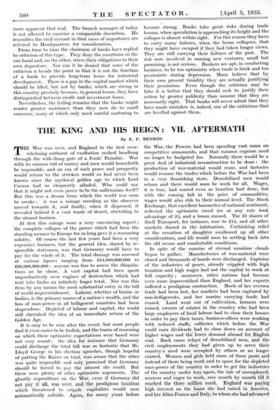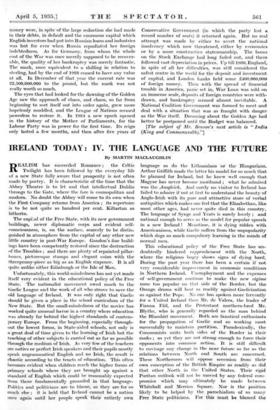THE KING AND HIS REIGN: VII. AFTERMATH
By E. F. BENSON THE War was over, and England in the first over- whelming outburst of exultation rushed headlong through the wide-flung gate of a Fools' Paradise. War with its ruinous toll of money and, men would henceforth be impossible, and an era of such peace and prosperity would return to the stricken world as had never been known since the mythical golden age to which Lord Curzon had so eloquently alluded. Who could say that it might not even prove to be the millennium itself? But this was a dream from which the world was soon to awake : it was a mirage receding as the observer moved towards it, and finally, when it dispersed, it revealed behind it a vast waste of desert, stretching to the utmost horizon.
At first this mirage wore a very convincing aspect : the complete collapse of the power which had been the standing menace to Europe for so long gave it a reassuring solidity. Of course the last few years had been a very expensive business, but the general idea, shared by re- sponsible statesmen, was that Germany would have to pay for the whole of it. The total damage was assessed at various figures ranging from /24,000,000,000 to £66,000,000,000: anyone was free to assess the dilapida-- tions as he chose. A vast capital had been spent unproductively over engines of destruction which had sent into limbo an infinitely huger total. Nor was this item by any -means the most substantial entry in the bill of world-impoverishment. Labour, whether of brains or bodies, is the primary source of a nation's wealth, and.the loss of man-power in all belligerent countries had been stupendous. Depleted of labour and capital, the world still cherished the idea of an immediate return of the Golden Age.
It is easy to be wise after the event, -but most people find it even easier to be foolish, and the trains of reasoning on which these optimistic expectations were based were not very sound : the idea for instance that Germany could discharge the total bill was so. fantastic that Mr.- Lloyd George in his election speeches, though hopeful. of putting the Kaiser on trial, was aware that the other was quite impossible and only promised that Gerinany should be forced to pay the utmost' she could. But there were plenty of other optimistic arguments. The ghastly expenditure on the War, even if Germany did not pay it all, was over, and the prodigious taxation. Which threatened to cripple capitalists would now automatically subside. Again, for many years before the War, the Powers had been spending vast sums on competitive armaments, and that ruinous expense need no longer be budgeted for. Naturally there would be a great deal of industrial reconstruction to be done : the production of war-material would cease, and factories would resume the trades which before the War had been in a very flourishing state. Demobilized men would return and there would soon be work for all. Wages, it is true, had soared even as taxation had done, but with the coming fall in the price of commodities, wages would also ebb to their normal level. The Stock Exchange, that excellent barometer of national sentiment, reflected the optimistic creed (or at any rate took advantage of it), and a boom ensued. The 11 shares of Shell Transport, for instance, rose to £14, and all other markets shared in the infatuation. Unthinking. relief at the cessation of slaughter swallowed up all other considerations, and life would soon be settling back into the old secure and comfortable conditions.
In spite of the surmise of eternal sunshine clouds began to gather. Manufactories of war-material were closed and thousands of hands were discharged. Captains of the industries of peace, already crippled with high taxation and high wages had not the capital to work at full capacity ; moreover, other nations had become even more impoverished than England, and her exports suffered a prodigious contraction. Much of her oversea trade bad been lost; her markets had been captured by non-belligerents, and her marine carrying trade had ceased. Land went out of cultivation, farmers were ruined, owners of estates in the country who had been large employers of local labour had to close their houses in order to pay their taxes, business-offices were working with reduced staffs, collieries which before the War could earn dividends had to close down on account of higher wages and the' lower demand abroad for English coal. Back came relays of demobilized men, and the civil employments they had given up to serve their country's need were occupied by others or no' longer existed. Women and girls held some of these posts and instead of there being work and to spare for the depleted man-power of the country in order to get the industries of the country under way again, the tale of unemployed, anxious and eager to work, rose month by month till it
reached the three million mark. England wais paying_
high interest on the loans she had raised in America, and her Allies France and Italy, to whom she had advanced money were, in spite of the large reduction she had made in their debts, in default and the enormous capital which English investors had put into Russian loans and industries was lost for ever when Russia repudiated her foreign indebtedness. As for Germany, from whom the whole cost of the War was once merrily supposed to be recover- able, the quality of her bankruptcy was merely fantastic. The mark, once equivalent to a shilling in relation to sterling, had by the end of 1928 ceased to have any value at all. In December of that year the current rate was 22,500,000,000 to the pound, but the mark was not really worth so much.
The eyes that had looked for the dawning of the Golden Age saw the approach of chaos, and chaos, so far from beginning to sort itself out into order again, grew more hopelessly muddled, and the League of Nations seemed powerless to restore it. In 1924 a new epoch opened in the history of the Mother of Parliaments, for the Labour Party was in power for the first time. Its reign only lasted a few months, and then after five years of Conservative Government (in which the party lost a record number of seats) it returned again. But no real attempt was made by either to avert the national insolvency which now threatened, either by economies or by a more constructive statesmanship. The boom on the Stock Exchange had long faded out, and there followed vast depreciation in prices. Up till 1930, England, in spite of all her difficulties, was still considered the safest centre in the world for the deposit and investment of capital, and London banks held some £400,000,000 of foreign money. Then with the spread of financial trouble in America, panic set in, War Loan was sold on an immense scale, deposits of foreign countries were with- drawn, and bankruptcy seemed almost inevitable. A National Coalition Government was formed to meet and deal with a situation that was as fraught with danger as the War itself. Dreaming about the Golden Age had better be postponed until the Budget was balanced.
[The subject of Mr. Benson's next article is "India (King and Cominonweal1h).1











































 Previous page
Previous page